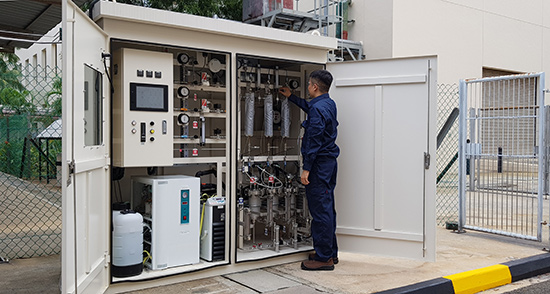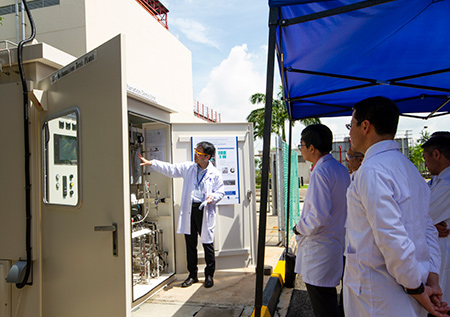Development of demonstration equipment for methanation technology that produces methane from CO2 - New CO2 recycling technology for the realization of a carbon recycling society -
IHI Corporation (Headquarter: Koto-ku, Tokyo, President: Tsugio Mitsuoka, hereinafter referred to as “IHI”) has developed a demonstration equipment for methanation technology (hereinafter referred to as “this technology”) that produces methane from CO2 using a methanation catalyst jointly developed with the Institute of Chemical and Engineering Sciences (hereinafter referred to as “ICES”) (*1), a research institute under Singapore’s Agency for Science, Technology and Research (hereinafter referred to as “A*STAR”) (*2). On 10th May, IHI and ICES invited over 30 guests from companies in the power and chemical industries in Singapore and held an opening ceremony of this equipment installed in ICES.
The Paris Agreement, adopted at COP21 in 2015, has set a long-term goal to limit global average temperature rise to less than 2 °C compared to before the Industrial Revolution. Among these, Japan aims to reduce emission of greenhouse gases by 80% by fiscal 2050 compared to fiscal 2013. Energy demand is expected to further increase in the future due to the progress of population growth and urbanization worldwide. Among them, it is a social issue to meet the increasing energy demand while suppressing the environmental load. To achieve this goal, in addition to the suppression of CO2 emissions, one of the greenhouse gases, it is necessary to establish recovery and reuse technology.
IHI is developing various technologies for the realization of a CO2 free and recycling society. As part of these efforts, we are working on the development of methanation technology that produces methane by recovering and reusing CO2 emitted into the atmosphere in the process of production and power generation, and reacting it with hydrogen. By supplying methane generated by this technology to existing pipelines, it can be used as fuel for power generation and city gas. For practical application of this technology, it is essential to activate CO2 by the catalyst to increase the reaction efficiency. Since the catalyst is degraded by the reaction, it needs to be robust for long-term stable use. IHI has been collaborating with ICES since 2011, and developed a unique methanation catalyst with high reaction efficiency and durability.
In Singapore, the carbon tax has been applied to power plants and chemical plants from January 2019. We will propose this technology to various customers in the electric power and chemical industries aiming to reduce CO2 emissions. In addition, Corporate Research & Development Division (Yokohama City, Kanagawa Prefecture) of IHI is also promoting performance verification. In near future, we plan to carry out further scaled-up demonstration tests in Japan.
Currently, in addition to this technology, we are developing various technologies to produce olefins such as ethylene and propylene that can be used as raw materials for plastics and resins from CO2. IHI aims to contribute to the realization of a CO2 free and recycling society by providing optimal integrated solutions to each customer, and will continue to work on technology development in the future.
| (*1) | Institute of Chemical and Engineering Sciences (ICES): Under A * STAR, this research institute conducts research and development on science and chemical engineering in a wide range of fields such as catalysts, bio, organic and polymers. Location: 1 Pesek Road, Jurong Island, Singapore 627833 Representative: Dr. Peter Nagler, Executive Director |
| (*2) | Agency for Science, Technology and Research (A * STAR): The public sector, which is the core of Singapore's science and technology research, is a legal institution that aims to create a vibrant knowledge-based society through world-class scientific research and human resource development. A*STAR supervise and support the research and development fields necessary for the growth of existing industrial sectors in Singapore and the creation of new growth industries, and support the formation of industrial clusters through provision of industrial resources such as intellectual resources and human resources. |
| (Attachment) |
| Demonstration plant of methanation technology installed in ICES |


